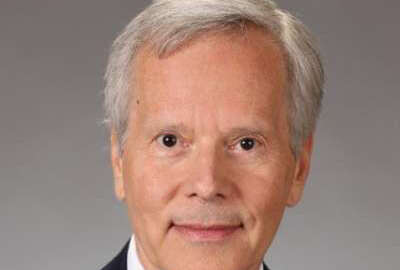

With how services contractors are thinking about the proposed infrastructure bill, president and CEO of the Professional Services Council, David Berteau.
Best listening experience is on Chrome, Firefox or Safari. Subscribe to Federal Drive’s daily audio interviews on Apple Podcasts or PodcastOne.
Administrations and Congresses have been talking about infrastructure for the past 20 years. This time something might happen. This time, though, the Biden administration is talking shovel-worthy projects, not shovel-ready, and that could be a whole new ballgame. With how services contractors are thinking about this, the president and CEO of the Professional Services Council, David Berteau, joined Federal Drive with Tom Temin.
Interview transcript:
Tom Temin: And actually, David, before we get into the infrastructure bill, I wanted to ask you about the skinny budget, which we don’t have as we speak now. And the longer it goes, the tougher it gets — doesn’t it?
David Berteau: Yes, it’s so skinny right now, you can’t see it at all, because, of course, the president did not release it to the Congress last week, we expected maybe this week, we’ll see. But even that is only going to set the top line numbers that will let Congress know generally what the administration’s budget, when it is released, will propose spending for defense and for civilian agencies. Congress, of course, is way behind schedule already, they have not begun negotiating on a budget resolution because they’re not quite sure what number to aim at, they’ve not begun marking up bills either in the authorizing side, for instance, the National Defense Authorization Act, or the appropriation side. They’re behind schedule, but the schedule is actually also shorter because not only do they have the October 1st start of fiscal year 22 to worry about, they have the August 1st reset of the debt ceiling. And we don’t know how long we can postpone that sort of thing. So there’s a lot of pressure on Congress at the back end, and there’s no provision of information at the front end. After the skinny budget release, we’ll still be maybe a month and a half or two months away from any details coming out of that, so it leaves the Congress in a lurch. It leaves contractors, of course, with a lot of uncertainty. And the impact on business is that agencies who don’t know what they’re going to get in fiscal year 22 may be reluctant to spend what they have in fiscal year 21, which is already more than half over. And so what we worry about is the dampening effect, work that’s important may be delayed or deferred contracts, may not be awarded. This will be a big problem.
Tom Temin: Well, even if the administration were to drop the skinny budget right now, given the context of this gigantic bill that they’re just gearing up to debate, it would almost be like spitting into a giant whirlpool in the ocean, the little flotsam that would get kind of swirled around until the big thing is over with, then they can get to the actual budget, which is dwarfed by the bill they’re talking about.
David Berteau: Right. If you look at the actual annual trend in discretionary appropriations, both defense and civilian agencies, it’s probably going to be somewhere in the neighborhood of $1.4 trillion for fiscal year 22. With the American Jobs Plan Act, that we haven’t seen the legislation yet, but we’ve had the factsheet and the President’s speech last week. That’s 2.2 trillion over eight years. So it’s not that much in the first year, but it’s a big number.
Tom Temin: It is a big number, and it is a lot more than simply infrastructure as people I think traditionally think about it, bridges and tunnels and so forth. Those are in there, but so is, well, pretty much every problem facing Western civilization.
David Berteau: And it’s part one of a two part series. So we haven’t seen the legislation, we don’t know the details. The fact sheet, of course, was 20 something pages long. So there’s a lot of facts in there. And it does have a lot of roads, bridges, infrastructure, rails, etc., ports. Those are important. Every year, we get a report card from the American Society of Civil Engineers, that says America’s infrastructure is crumbling. And clearly we can’t stay competitive on a global framework of an economy if we don’t have an infrastructure in place. But there’s a lot more to it than that. And I think contractors look at this from two ways. Number one is the government itself has infrastructure problems. And the pandemic has certainly revealed that, right? The weaknesses of our own infrastructure, both IT systems and networks and data systems across the board is well documented over the last year. And of course, highlighted by things like SolarWinds, and Microsoft Exchange Server hacks, etc. So there’s plenty of opportunity and important needs to rebuild the government’s own infrastructure. And then of course, there’s the contractor support that will come along with many of these programs to be put in place. Now, we don’t know what the legislative proposal is. And we certainly don’t know what Congress is going to end up enacting, but contractors are eyeing this with care.
Tom Temin: And I’ve gotten emails on a couple of occasions now already from new coalitions, new organizations formed around what they have read in that summary that the White House put out, already gearing up to go after the money. Are you finding that your members, are they just going to wait and see what’s in there and kind of play it by ear?
David Berteau: Our members feel pretty strongly on the need for rebuilding the government’s own infrastructure. In the American Rescue Plan Act that was signed just back in March, there was an extra billion dollars for the technology modernization fund. If you look at what the government spends on IT and data systems every year, it’s now approaching $100 billion, and 90% of that, of course, has to stay in legacy systems. So adding a billion dollars to what’s $100 billion budget is really not enough modernization. I think we’re going to be pushing very hard for increased modernization funding across the federal government, we think that’ll do three things. Number one, it’ll boost the government’s ability to operate. Number two is it will increase cybersecurity, because one of the best things you can do is get rid of old legacy systems that aren’t even being updated anymore, and certainly not protected. And number three is actually it will let the government deliver better services to the American people. And that’s an important step for beginning to restore trust in the government, independent of the politics, just have the government do its job better.
Tom Temin: And I would think, too, is as the government does rebuild its own infrastructure, it’s a great opportunity for the kinds of services where companies help the government reengineer its business processes, and then apply the robotic process automation and machine learning to these newly designed processes, because that’s how you’ll get the next round of services delivered out to the public.
David Berteau: That kind of change, Tom, is precisely what’s needed. And this is not only a change in applying technology and new systems and processes, it’s a change in the way the government thinks about contracting. What you need is, in fact, for programs to be proposed and bid and awarded and performed based on the results they achieved, not based on input so many labor hours in so many labor categories across companies. That’s a huge change for the federal government is one that our members look forward to supporting. And it should be a part of the American Jobs Plan if it gets into Congress.
Tom Temin: And connecting another dot here, now the White House is going to nominate Mike Brown as the next Undersecretary of Defense for Acquisition and Sustainment. And he’s running the Defense Innovation Unit right now, which has all of these different and unorthodox and new approaches to getting new technology and new vendors into government. Whether it signals anything or not, is hard to tell yet, but that is an interesting choice
David Berteau: It’s, I think, a very powerful signal. The way the government needs to get innovation, and as you mentioned earlier, to improve performance and deliver better services to the people across America is important. To do so outside of the normal procurement process is the reason THE DIU was set up in the first place. Now to take a guy who’s in charge of avoiding the normal process and put him in charge of the normal process in DoD is an intriguing prospect. We have maintained all along that if you can fix the procurement system for some people, outside innovators for example, you really should be able to fix it for everybody. And I think this could be an opportunity to revisit that question, could be very exciting. In addition, the Defense Department is just finishing up some very interesting work directed by last year’s National Defense Authorization Act to integrate and consolidate all of the acquisition statutes under Title 10, which is a part of the US code that governs the Defense Department. They’ve put a preliminary effort of that in a report to Congress that we’re looking at right now. So this is a great time to be looking at really fundamentally changing how we do acquisition so we can buy results and innovation rather than the stodgy old way of doing business.
Tom Temin: And given the scope of the bill, this could also spread to state government, which is another big opportunity. And if there’s any kind of tie in of state and local systems with federal systems, and we know there is, then this could really be a bigger opportunity than just federal.
David Berteau: It could certainly be, and a lot of the same things that would work better at the federal level will work better at the state level. Conversely, there are a lot of new ideas that are tried at the state level, which if they’re successfully implemented, whether it’s healthcare or home care, or whatever it is the government program is trying to support, then that’s the kind of thing that you can scale up to the federal level if you have the appropriate records in place. We’re watching very carefully what the new acquisition regulations are coming out of the new administration as they begin to fill these seats, including the Undersecretary for Acquisitions and Sustainment in DoD.
Tom Temin: David Berteau is president and CEO of the Professional Services Council. Lots to look forward to, thanks so much for joining me.
David Berteau: Alright Tom, thank you and play ball.
Copyright © 2025 Federal News Network. All rights reserved. This website is not intended for users located within the European Economic Area.
Tom Temin is host of the Federal Drive and has been providing insight on federal technology and management issues for more than 30 years.
Follow @tteminWFED


